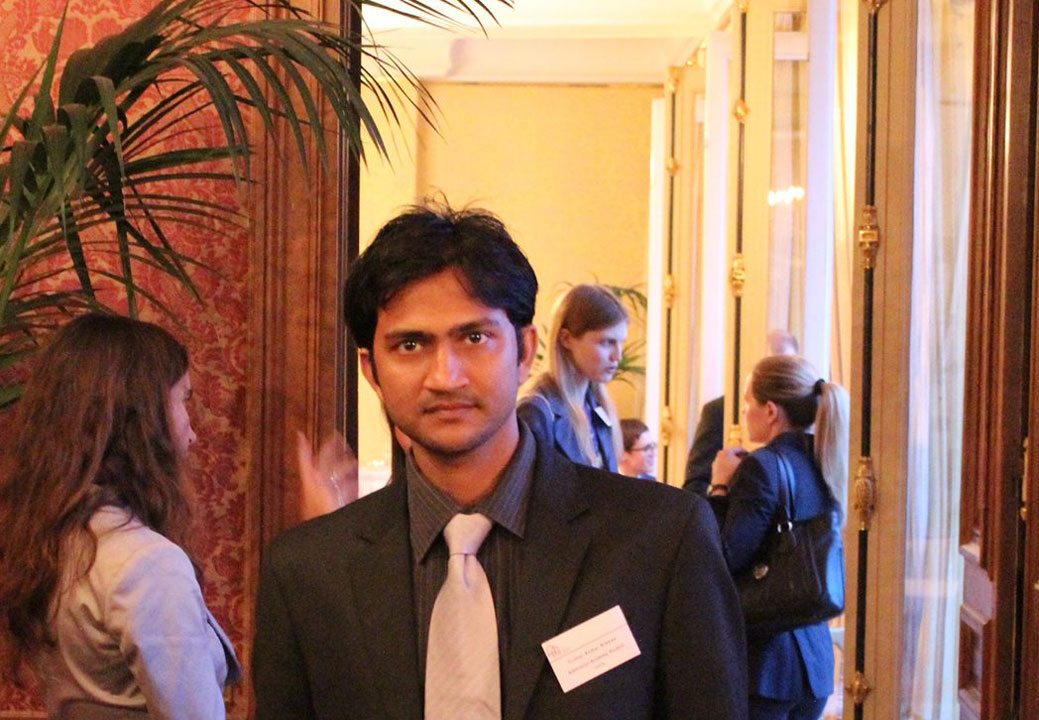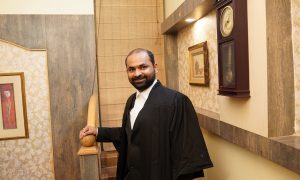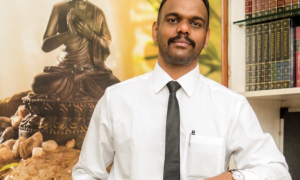Tushar Kumar Biswas is presently a Ph.D candidate at West Bengal National University of Juridical Sciences, Kolkata. He has numerous books and publications to his name, he therefore speaks to us about the importance of research in a lawyer’s life. He tells us how to identify a field of law to write upon and how to go about the tough task of finding and chosing a publisher for your book.
Key takeaways:
- How to select area of interest before starting to write
- How to choose a publisher for your book
- Importance of co-authorship
- Importance of publications in legal career
How would you like to introduce yourself to our readers?
I am a PhD Candidate at the West Bengal National University of Juridical Sciences, Kolkata. I have studied at the International Academy for the Arbitration Law, Paris and The Hague Academy of International Law, Netherlands (Private International Law session). I am a member of the Young International Council for Commercial Arbitration (ICCA) and the Young International Arbitration Group (YIAG). I am a former Visiting Fellow at the Jindal Global Law School, Haryana, NCR Delhi.
Why did you want to study law?
I do not have direct descendants who are lawyers as my father is a teacher and grandfather was a doctor by profession. One of our close family associates who is a renowned lawyer motivated me to study law. To be honest, when I started to study law, little I knew that the horizon of the legal profession is so vastly expanded and there are numbers of things one could do which perhaps may not be possible in other professions.
What were your areas of interest during your graduation?
During my graduation, I developed interest in number of areas such as human rights law, information technology law, constitutional law and international commercial arbitration. I kept on reading a lot in these areas and subsequently wrote a number of articles in various world reputed journals. What interested me more is the conflict dimension of various and seemingly divergent branches of law, whether we are talking about human rights or commercial law.
Did you do any internship during your graduation? Did you receive any assistance regarding this from your college?
Yes, I did a number of internships right from lawyers’ chambers to the legal department of a company. I got assistance from the University only once and the rest of the time I applied on my own and got through.
What was your motivation behind doing an LL.M.?
I have done my L.L.M primarily to gain more knowledge of some specific fields that were of interest to me. However, it was also at the back of my mind that opportunities follow from every higher degree. I knew that this would open up an avenue for getting into academia without jeopardising other opportunities. I also got to learn a lot about legal research tools and presentation techniques in a way that complemented the research and practice skills I had developed through prior studies and work experience.
Tell us about the process of getting published.
As a student, I gradually started to gain interest in legal writing and was successful in publishing some articles. I frequently used to visit Prof. D.N. Bannerjee (Founder-Chairman of Central Valuation Board) who first generated the idea of writing a book. We had planned to co-author a book on property law, but eventually I started writing on my own.
When did you start writing? How much time did it take?
I started writing the book during my L.L.M studies. It took more than three years of full time effort to complete the task.
Please give us the highlights of your best work.
I have written a ‘Guide book on Good Governance for Law Institutes in India’ pursuant to my long standing association with the Institutes of Rural Research and Development (IRRAD). I had the opportunity to publish articles in some of the world reputed law journals such as International Company and Commercial Law Review, Sweet & Maxwell, London; International Arbitration Law Review, Sweet & Maxwell, London; International Sports Law Review, Sweet & Maxwell, London; Asian Journal of International law; Asia-Pacific Journal on Human Rights and the Law, Martinus NIJHOFF Publishers, (Leiden-Boston); The Computer Law & Security Review – The International Journal of Technology Law and Practice (Elsevier); Commonwealth Law Bulletin, London, the flagship publication of the Legal and Constitutional Affairs Division (LCAD); Journal of Medicine and Law, World Association for Medical law (WAML), Israel; Computer and Telecommunications Law Review, Sweet and Maxwell, London.
I also got invited to join the team of authors for ‘European Encyclopaedia of Private International Law’ and presently I am editing a book on ‘Arbitration Law from Comparative Perspectives’.
How did publishing affect your legal career?
A career in law is all about research (if I am allowed to say so). If one can establish oneself as a researcher by publishing quality writings, it surely will have a positive effect in securing jobs not only in academia but also in other fields. Having said that, I want to see a day when the question is reversed, young lawyers are asking the question will we be able to keep on writing if we get into the job? The value of legal research exists independently devoid of other considerations.
How do you identify and decide on a topic or area of law to write on?
The identification process varies. For writing an article, one may choose to look at the conflicting decisions of various courts/tribunals in any particular area or conflict in theories and even one may consider doing situation analysis. Some may choose to write in an area where already plenty of works have been done and there is still scope of development whether from a different angle or same angle. At the same time, once sufficient knowledge is acquired, one may go for inter-disciplinary research.
Is it a good idea to find a co-author?
It depends. If you find someone who operates in your field, you may choose to do so, but the co-author must have the same sense and same understanding about the intended work. These can prevent any potential conflict. At the same time, there are some inherent practical risks of having a co-author such as the free rider problem.
I wrote this book alone. However, I would not mind working with a co-author in near future.
How does one find a publisher, and at what stage of writing?
That’s a very good question. Finding a good publisher and convincing that publisher about the whole work is perhaps one of the most difficult tasks, especially if you are an emerging writer or just beginning your writing activities. This is because, unlike an established writer, the publishing house and more importantly the targeted audience would probably not know you.
In order to find an appropriate publisher, one needs to do some initial research. However, it is also judicious to keep in mind the best available alternatives because there may be situations where your priority may not work out. One can approach the publisher either before finishing writing or after the completion of writing. However, if you are an emerging writer, it is always advisable to approach the publishers before you finish writing to alleviate avoidable risks.
How did you choose one publisher over another?
Well, it depends primarily upon the field of law you are writing on. There are some publishers who operate only in some selective fields and others may be operating in multiple fields. For example, if you choose to write on ‘Arbitration Law’, then probably ‘Kluwer Law International’ is the best known name in the legal world. Similarly, if you write on some other area, there you may choose to find some other reputed publishers operating in that field. However, merely choosing the best publisher is not enough. What is important is to deliver quality writings in the targeted field.
Is there any success mantra that you follow which you would like to share with our readers?
Dedication and hard work matter. From the point of view of a writer or a legal researcher, it is equally important to develop analytical skill along with these two elements mentioned earlier. However, in order to achieve success, it is important to analyze the constraints of getting success.
Please find here a detailed article on how to get an ISBN Number.
























